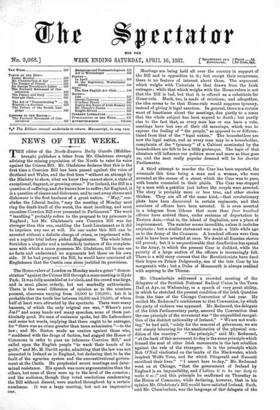The Home-rulers of London on Monday made a great "
demon- stration" again st the Crimes Bill through a mass meeting in Hyde Park. It was fully assembled at 4 o'clock, and the crowd was large, and in most places orderly, but not markedly enthusiastic. There is the usual difference of opinion as to the numbers present, observers varying from 50,000 to 150,000; but it is probable that the truth lies between 50,000 and 70,000, of whom half at'least were attracted by the spectacle. There were many banners, of which the only original one was, " Where's poor Joe P" and many bands and many speeches, none of them par- ticularly good. No man of eminence spoke, but Mr. Labouchere said some hot words, implying that there ought to be outrages, for "there was no crime greater than tame submission "—to the law ; and Mr. Sexton made an oration against those who, "maddened with the drugs of faction, had gagged the House of Commons in order to pass an infamous Coercion Bill," and called upon the English people "to wash their hands of its guilt ;" and Mr. M. Davitt spoke, admitting that the law was not respected in Ireland as in England, but declaring that to be the fault of the agrarian system and the unconstitutional govern- ment at the Castle. He prophesied secret meetings and deter- mined resistance. His speech was more argumentative than the others, but none of them were up to the level of the occasion ; and the audience, though they voted resolutions condemning the Bill without dissent, were marked throughout by a certain numbness. It was a large meeting, but not an impressive one. Meetings are being held all over the country in support of the Bill and in opposition to it ; but except their occurrence, there is no feature of interest about them. The argument which weighs with Unionists is that drawn from the Irish outrages ; while that which weighs with the Home-rulers is not that the Bill is bad, but that it is offered as a substitute for Home-rule. Much, too, is made of evictions ; and altogether, the idea seems to be that Home-rule would suppress tyranny, instead of giving it legal sanction. In general, there is a certain want of heartiness about the meetings, due partly to a sense that the whole subject has been argued to death ; but partly also to the fact that, as every man has or can have a vote, meetings have lost one of their old meanings, which was to express the feeling of " the people," as opposed to or differen- tiated from that of the "legal nation." The householders are now the legal nation, and as every man may be a householder, complaints of the " tyranny " of a Cabinet nominated by the householders are felt to be a little grotesque. The logic of that situation will influence our politics more and more as time goes on, and the next really popular demand will be for shorter Parliaments.


































